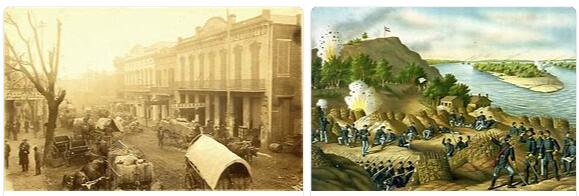Long home to the Chickasaw, Choctaw and Natchez Indian tribes, the first Spanish explorer to reach the area was Hernando De Soto, who discovered the mouth of the Mississippi River in the mid-1500s.
Mississippi lands were claimed by France in 1682 by Robert Cavelier, Sieur de la Salle. In fact, after sailing down the Mississippi River, he claimed all the land in the Mississippi Valley, naming it Louisiana , after its king, Louis XIV.
Soon French settlements were established along the Gulf of Mexico coastline from New Orleans to Mobile, including several in Mississippi. As word spread north about the value of this new territory, settlers began to arrive by the thousands.
When the intruders entered their lands, the Indians of Natchez were the first to riot, but were countered by the military firepower of the French forces.
When the French and the Indian War ended in 1763, French influence over the Mississippi lands was ended, the British took control, and turf battles with the Spanish continued for another 20 years or so.
In 1783 the British (by agreement) gave their West Florida lands to Spain. Ironically, in 1783 the Treaty of Paris formally ended the American Revolutionary War, and in defeat, all British controlled lands (including most of the Mississippi) ceded to the US.
The Spaniards held on to their remaining lands for only a few short years as pressure from the rapidly growing US mounted, and by 1812, the United States ruled the entire Mississippi Territory, included all of Alabama, Mississippi, and West Florida lands.
In 1817 the US Congress divided this large territory into the Mississippi and the Alabama Territory. One year later, Mississippi officially became the 20th state of the US, and Alabama followed in 1819.
By the mid-1820s, most Indian homelands had ended, and with the remaining Indian tribes forcibly relocated to Oklahoma , tracts of fertile land were now available and large cotton plantations, soon flourished.
Wealth derived from the endless toil of black slaves in the South (more than 400,000 in Mississippi alone) was a burning issue between North and South, and that debate was at the forefront of America’s Civil War (1861-1865).
Mississippi Timeline
1500s – 1600s
- (1540 – 1541) Hernando De Soto entered the Mississippi; discovered Mississippi River
- (1673) French missionary, Father Jacques Marquette, and fur trapper Louis Joliet explored the Mississippi River; Gulf Coast achievement
- (1699) Pierre Lemoine, Jean Baptiste built Fort Maurepas, the first capital of the French colony on the North American continent
1700s
- (1716) Fort Rosalie (now Natchez) established
- (1729) French settlers at Fort Rosalie massacred by Indians of Natchez
- (1732) French retaliated against Natchez Indians; tribe ceased to exist
- (1736) The Chickasaw Indians defeated the French at the Battle of Ackia
- (1763) Mississippi passed into English control after the French and Indian War
- (1779) Spanish governor of Louisiana, Bernardo Galvez, captured Natchez
- (1781 – 1783) Mississippi divided – Spain ruled south; America ruled the north
- (1797) Spain ceded the Mississippi to America
- (1798) Mississippi organized as an American territory
1800s
- (1801 – 1802) The Natchez Trail developed as a mail route, main road; capital moved from Natchez to Washington, Mississippi
- (1805) A Choctaw sold 4.5 million acres of land in the United States.
- (1812) War of 1812 started; Mississippi took control of West Florida Territory
- (1815) War of 1812 ended
- (1816) Agreement with the Choctaw Indians opened the land around the Tombigbee Prairie to settlement
- (1817) Mississippi became 20th state; Indian lands opened to white settlement
- (1822) State capital moved towards Jackson
- (1830) All Choctaw territory east of the Mississippi River ceded to the US; the Choctaw Indians left the state; all of the Chickasaw Territory in the north, which is ceded to the US; Chickasaws moved to Oklahoma
- (1850) American Congress gave Mississippi three million acres of swamp and floodplain; dams were built along the river, created the Delta; land available for cultivation; the compromise of 1850 allowed slavery
- (1861) Civil War has begun; The Mississippi was moving away from the Union; Sudna Island is captured by the Union Army
- (1862) Union captured Corinth
- (1863) Emancipation Proclamation abolished slavery
- (1865) The Civil War is over
- (1867) US Congress rejects restored state government; military government established
- (1868) Voters rejected colored constitutional “Black and Tan Covenant” that protected the rights of ex-slaves, punished ex-allies
- (1869) Constitution that did not punish ratified ex-allies
- (1870) Mississippi re-admitted to the Union; public education set
- (1890) New state constitution passed
1900s
- (1903) New Capitol building dedicated in Jackson
- (1907) Weevils destroyed cotton crops
- (1908) Statewide ban passed
- (1922) System of two-year colleges authorized by the State Legislature (first in the US)
- (1927) Mississippi River flooded 2,722,000 acres in Delta area; thousands of homeless
- (1932) State sales tax went into effect
- (1939) First oil well being drilled in Yazoo County
- (1954) Brown v. Board of Education management laid the groundwork for desegregation
- (1962) James Meredith, first black registrant, went to University of Mississippi
- (1964) Civil Rights Act passed outlawing segregation in public places
- (1969) Segregation in public schools ended; Hurricane Camille hit causing catastrophic damage
- (1976) Savings and Loan Associations Restructured by the Legislature to Avert a Financial Crisis
- (1979) Flood devastated Jackson and other cities along Zhujiang
- (1986) Tennessee-Tombigbee Waterway completed
- (1992) Tornado struck, 15 killed, over 300 injured
2000s
- (2004) Voters banned same-sex marriage
- (2005) Hurricane Katrina caused severe, catastrophic damage along the coast; 238 dead, 67 missing and billions of dollars in losses; ex-KKKlansman convicted of manslaughter in 1964, killing three civil rights workers
- (2006) Bureau of Economic Analysis, rated the lowest per capita personal income of any state, also had the nation’s lowest cost of living; sex offenders; names and faces placed on roadside billboards
- (2010) Tornado hit southeast Mississippi killed ten, state of emergency declared in 17 counties
- (2012) Before leaving office Gov. Hayley Barbour issued full pardons to 208 inmates, including 14 convicted murderers








